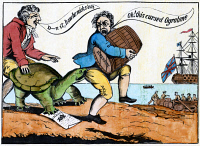Thomas Jefferson Presidency
1/16
Earn XP
Description and Tags
Quiz on Tuesday
Name | Mastery | Learn | Test | Matching | Spaced | Call with Kai |
|---|
No analytics yet
Send a link to your students to track their progress
17 Terms
The Election of 1800
this election was the first peaceful transfer of power between political parties in the United States, from the Federalists to the Democratic Republicans, with Thomas Jefferson defeating current presidentx John Adams.
Jeffersonian Principles
Agrarian Society, standing armies dangerous, avoid entangling alliances, limit international trade, strict interpretation of Constitution, limit power of the Federal Judiciary, Bill of Rights, white supremacy
Barbary Pirates
When Jefferson became president, the Barbary States were demanding payments from the U.S. to prevent attacks on American ships. Instead of continuing to pay, Jefferson sent the U.S. Navy to fight the pirates, leading to the First Barbary War. It was not Jeffersonian because it went against the Jeffersonian ideal of having a smaller, weaker military.
Marbury Decision
This Supreme Court case happened because Jefferson’s administration refused to deliver official papers to judges appointed by the previous president, John Adams. The ruling established judicial review, which gave the Supreme Court more power by allowing it to decide if laws were unconstitutional. This was not Jeffersonian because it ended up creating Judicial Review which gave the Judicial Branch more powers, something Jeffersonians were against
Louisiana Purchase
Jefferson made a major decision to purchase the Louisiana Territory from France in 1803, which doubled the size of the U.S. While this was a huge achievement, it was not very Jeffersonian because the Constitution did not give him the power to buy land. Normally, Jefferson believed in a strict interpretation of the Constitution and limited government, but in this case, he used broad federal power to complete the deal.
Chesapeake-Leopard Affair
In 1807, the British warship HMS Leopard attacked the USS Chesapeake off the coast of Virginia, demanding to search for British deserters. When the Chesapeake’s captain refused, the British opened fire, killing and wounding American sailors before taking four men by force. This attack outraged Americans, and many called for war, but Jefferson chose to respond with diplomacy and economic sanctions instead. This was Jeffersonian because it avoided war meaning they remained neutral and they avoided having to enlarge the military
Slavery
Jefferson himself owned many slaves throughout his life and believed that black people were incapable of improving their minds and that they had a separate ancestry. This was not Jeffersonian as Jefferson spoke about people's individual rights and liberties, but his actions didn’t match his words by denying slaves those rights.
Embargo Act
In response to British and French interference with American trade, Jefferson pushed for the Embargo Act of 1807, which banned all U.S. exports. He believed that economic pressure would force Britain and France to respect American neutrality, but instead, the act severely damaged the U.S. economy, especially for merchants and farmers. This decision was Jeffersonian as the act significantly limited trade for Americans, which was something that the Jeffersonians would have enjoyed as they did not want a country based on international trading and instead the plants grown from within the country.

what is this cartoon about?
the Embargo Act of 1807; intended for the American audience against the Embargo Act to spread the word to said American audience that Jefferson’s views were unfair
War of 1812 Causes
The War of 1812 was a conflict between the United States and the British Empire, arising from American entanglement in two international issues: maintaining neutrality during Anglo-French wars and colonial and Revolutionary era conflicts.
Important people in the War of 1812
Thomas Jefferson, William Henry Harrison, Henry Clay of Kentucky and John C. Calhoun of South Carolina, James Madison,
War of 1812; Impact on the United States
The United States launched their second offensive against Canada and the Great Lakes. In this period, the Americans won their first successes.
War of 1812, Impact on Canada
The war would represent another battle against the Loyalists, some thirty-eight thousand of whom had populated Upper Canada after the Revolution and sought to establish a counter to the radical experiment of the United States.
Impressment
Seizing of American ships and sailors (Forced Military Service)
Macon’s Bill No. 2
Officially ended the Embargo & allowed American trade with England and France
Commerce
Trade
The Election of 1808
Despite national anger over the Embargo Act of 1807, the Republican Party maintained control of the presidential spot, with Madison’s securing his first of two presidential term.